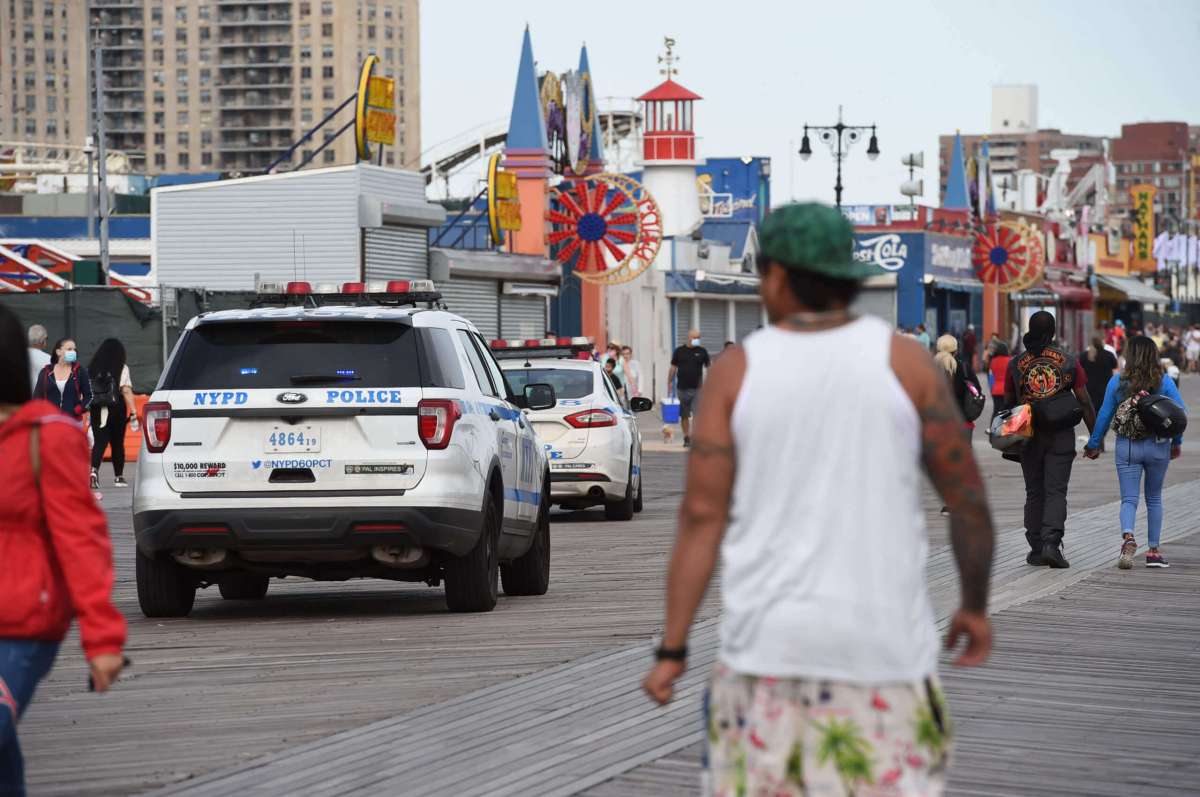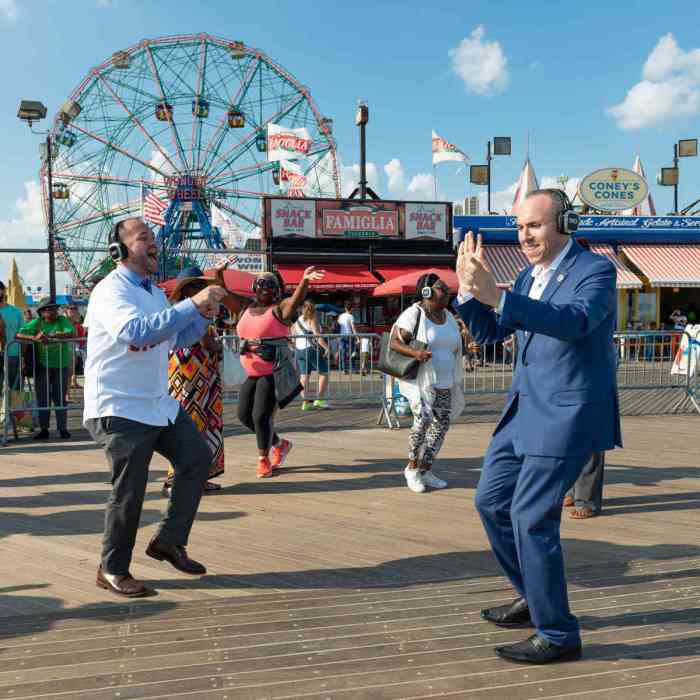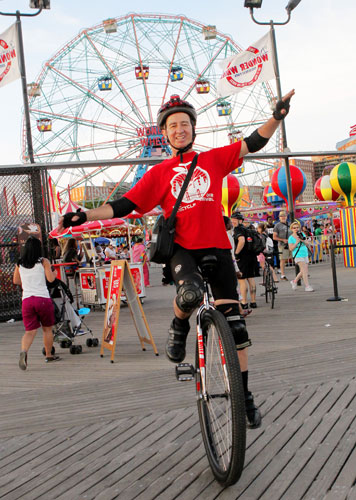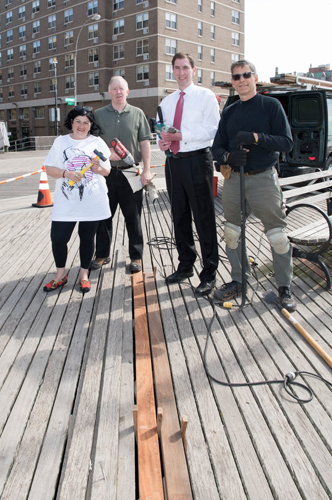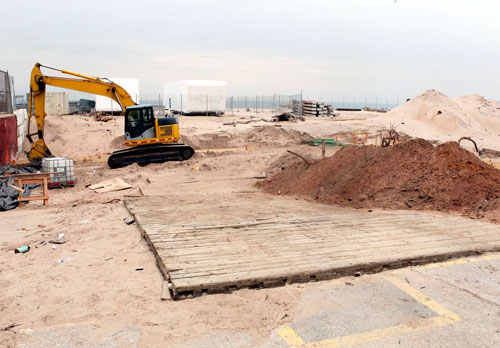Vehicles are now banned from Coney Island’s Riegelmann Boardwalk, after a local pol’s bill got the green light in the City Council on Thursday — preserving the crumbling monument from further damage brought on by the heavy four-wheelers.
“The historic Riegelmann Boardwalk in Coney Island is not the Belt Parkway,” said Councilmember Mark Treyger. “It is an iconic American place of leisure and recreation — it was not designed as a roadway for utility vehicles.”
While most vehicles are already prohibited from traversing the 98-year-old boardwalk, police officers often patrol the 2.7-mile span and the city’s Parks Department conducts routine inspections, repairs and garbage removal using either lightweight carts known as gators or larger, bulkier vans and trucks the span is not meant to withstand.
“Typically seven months out of the year, they are using their very heavy vehicles on the boardwalk back and forth,” said Coney Island resident Orlando Mendez. “I am trying to figure out what they are doing because they don’t seem to be doing anything other than riding back and forth during the offseason.”
Locals charge that the vehicles’ use of the boardwalk has led not only to damage, but also to injury. The boardwalk’s often dislodged wooden planks have had costly consequences, such as when a Brighton Beach man sued the city after his leg fell through a wooden board and when former Councilmember David Greenfield injured his leg in the same fashion.
“Anybody who has any real knowledge of the boardwalk knows that all of the significant damage has been caused by heavy vehicles being driven over the boardwalk at high speeds,” said Rob Burstein, president of the Coney-Brighton Boardwalk Alliance. “All of the major damage is done by heavy vehicles rumbling over the boardwalk popping up nails and causing loose boards and all kinds of other damage which cause essentially the destruction of wide swaths of the boardwalk and tremendous safety issues and diminished the enjoyment of people’s use of the boardwalk.”
While the high-traffic amusement area is relatively well-maintained, Burstein pointed to areas of the walkway which are in decrepit condition — including a stretch between W. 23rd and W.27th street, near a Parks Department facility. That stretch, Burstein said, serves as a main entry point for agency vehicles, and is deteriorating to the point where plywood boards were put over the wooden planks.
“That is where all of the heavy trucks and vehicles from the Parks Department typically enter and exit the boardwalk, that area for many years has plywood thrown over it,” Burstein said.
‘A problem decades in the making’
In response to his constituents’ years-long advocacy for a boardwalk-wide ban on cars, Treyger introduced legislation in February 2020 which would set a weight limit for vehicles. The bill passed in the Council’s Parks Committee on Wednesday, and was passed by the full Council Thursday.
For locals — more than 100 of whom are members of a group called “Concerned Residents for a Safer Boardwalk” — the resolution is well overdue.
“This is a problem decades in the making, it’s been going on for a long time,” Burstein said. “All of the wood boardwalks that want to conserve their wood obviously don’t allow heavy vehicles on their boardwalks.”
Treyger’s bill would require authorized city employees to utilize vehicles under 2,400 pounds for activities on all city boardwalks — limiting city agencies to the lightweight gators — unless larger vehicles are absolutely necessary for construction, maintenance or public safety.
“Years of heavy vehicles driving on the Boardwalk have caused significant damage to the landmarked site,” Treyger said. “By prohibiting vehicles from driving on boardwalks and limiting the weight of public safety and maintenance utility vehicles, we are giving the Boardwalk in Coney Island back to the people.”
His legislation also invokes a penalty of up to $1,000 or 90 days imprisonment for unauthorized vehicles who ride on the boardwalk, which the councilman said has previously occurred without enforcement. For that reason, locals say, they have their doubts higher fines will lead to any increase in execution.
“I have witness motorized motorcycles on the boardwalk and private cars on the boardwalk,” said Mendez. “It will be welcomed to get that banned [but] I would like to see what the mechanism is going to be for enforcement because the police department hasn’t been willing to enforce anything … and the New York City Parks Department who has their security people out there during the season hasn’t done anything either.”
Brighton Beach resident Craig Hammerman is advocating for a similar bill on the state level to amend the state’s Vehicle and Traffic Law— the de facto ruling for all agencies in New York State enforcing traffic laws — arguing it would strengthen the law as it could be carried out by all state agencies, including state troopers, and would be effective on all of New York’ sprawling boardwalks. It would also enable state troopers to impose compliance of the bank.
“I think having a law embedded in the Vehicle and Traffic Law would make it easier for it to be enforced,” he said. “Because it would become like a standard state law that anyone that does traffic enforcement follows.”
Other advocates welcomed Treyger’s legislation as a good first step but said they’d like to see the city go further in banning vehicles outright from the boardwalk, or providing agencies with lightweight vehicles to enable them to abide by the new rules.
“We, as a community need to do a better job advocating for the 60th Precinct to get the tools that they need,” Hammerman said. “It’s clearly not an all-out ban of every vehicle on the boardwalk which I think is the ideal but its a huge step in that direction. Just establishing that driving is illegal really changes the nature of that conversation moving forward.”
Looking ahead
The lawmaker plans to follow up his vehicle ban with legislation that would necessitate the city hire a year-round repairman for the boardwalk, after a Parks official recently revealed that the city only contracts carpenters during the summer and as needed for repairs in the offseason.
“Outside the [peak] season, no carpenters are specifically dedicated to Coney Island, but we’re doing repairs whenever they’re necessary,” said Mark Focht, the deputy commissioner of maintenance for the Parks Department at an April 12 City Council hearing. “During our peak season … around now through the season, we dictate two carpenters to maintain the boardwalk.”
Notwithstanding the councilmember’s bill, the agency is already underway on a $3.2 million project installing bollards at all of the walkway’s entrances to prevent terrorist attacks. That work is expected to be completed in 2022, according to Focht, which Treyger said was a request from his office.
“It is also welcome news that the administration granted our request to install protective barriers along Boardwalk entranceways to block vehicular access, with the exception for emergency services,” the pol said in a statement. “In addition to mitigating the dangers posed to pedestrians by having vehicles on boardwalks, this legislation will help ensure we further protect the landmarked Riegelmann Boardwalk.”
While boardwalks made of concrete may be easier to maintain, Burstein credits the unmatched aesthetic appeal of a wooden boardwalk as one which symbolizes their beloved neighborhood and doubles as a tourist attraction, helping drive business in Coney Island.
“If you ask people to close their eyes and think about walking on a wood boardwalk as opposed to concrete, its a totally different experience,” Burstein said. “There is no reason we can’t maintain it in a way that preserves it for everyone’s use now and for generations to come.”
Update (April 22, 4:30 pm): The article was updated to reflect the bill’s passage before the full City Council.


